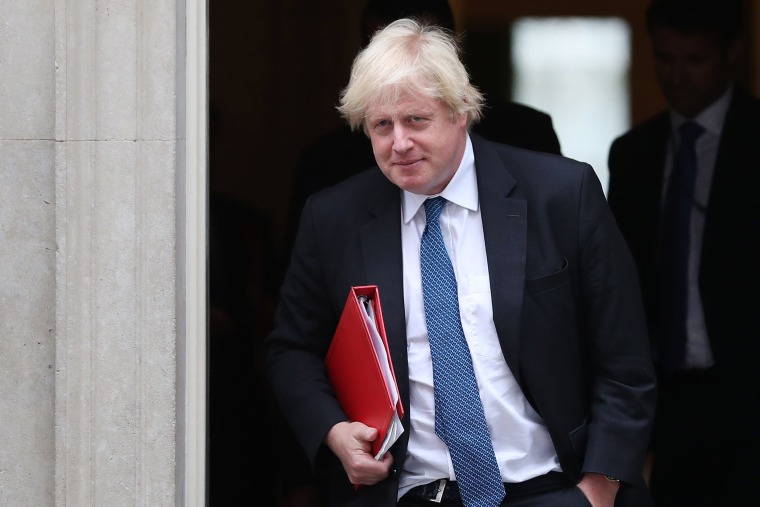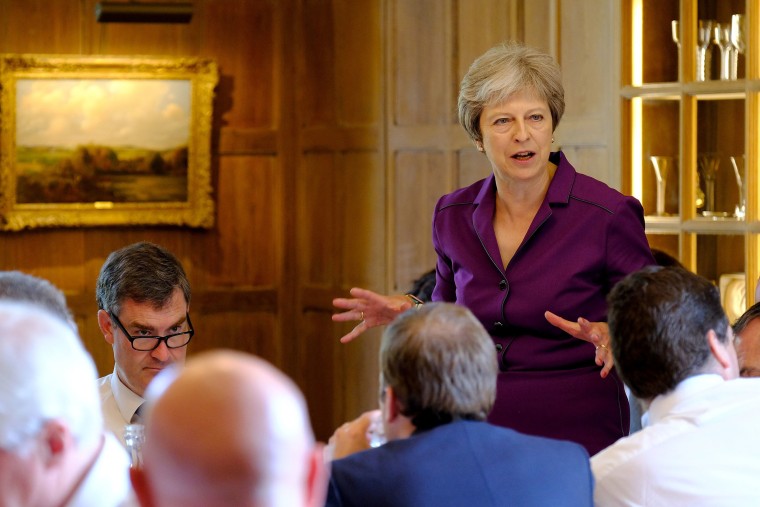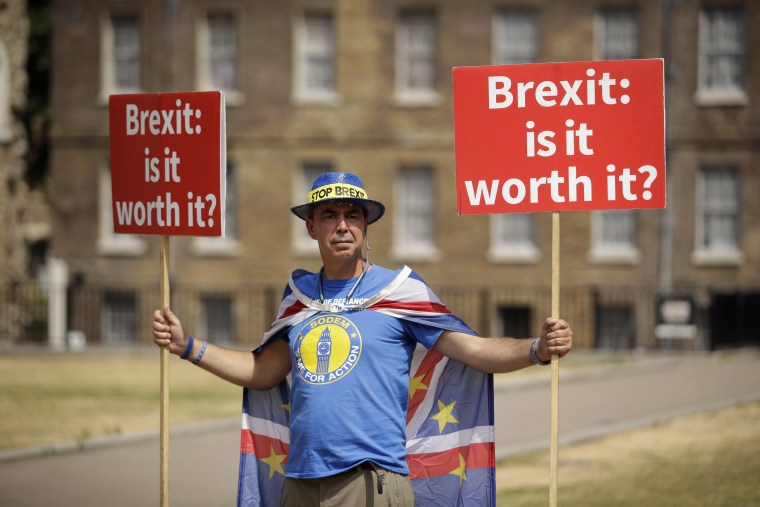LONDON — British Prime Minister Theresa May was trying to save her government Tuesday after it was damaged by a series of resignations over the nation’s Brexit crisis.
She held a meeting of her new Cabinet, determined to ride out threats of a leadership challenge from within her ruling Conservative Party.
The turmoil came on top of preparations for this week’s controversial visit by President Donald Trump and a thorny NATO summit meeting.
At the heart of the problem is progress, or lack of it, toward Britain’s departure from the European Union, which former Secretary of State Madeleine Albright on Sunday described as “an exercise in economic masochism that Britons will long regret.”
What just happened?
Foreign Secretary Boris Johnson and Brexit Secretary David Davis quit within hours of each other, along with a handful of junior ministers and aides.

The resignations blew apart May's claim to have finally secured backing for her vision of Britain’s future relationship with the E.U. — a plan that was only agreed on Friday.
Their departure also exposed the scale of Britain’s disarray: With only 262 days left until it leaves the trading bloc, and more than two years since the process began, the U.K. government still hasn’t agreed what it wants Brexit to look like — never mind negotiate with the E.U. to make it happen.
Why did they quit?
Johnson, a loud pro-Brexit voice, was unhappy with May’s Brexit plan to keep the U.K. and the E.U. in a free-trade zone for goods and to commit Britain to maintaining the same rules as the bloc for goods and agricultural products.
"Brexit should be about opportunity and hope," he said in a scathing resignation letter that was echoed in headlines in a number of Britain's national newspapers. "That dream is dying, suffocated by needless self-doubt."
Britain is “truly headed for the status of colony” under May’s plan, he said — a choice of words that is unlikely to help future trade talks with post-imperial Commonwealth countries.
“What is even more disturbing is that this is our opening bid,” Johnson wrote. “It is as though we are sending our vanguard into battle with the white flags fluttering above them.”
Davis also criticised May’s plan as “weak.”
The resignations triggered open warfare among Conservative lawmakers, who demanded May change her plan or stand aside.
Their departure reflected a decades-old fault line running through the Conservative Party over Britain’s role in Europe, and whether it should be in or out of the E.U. The 2016 Brexit referendum was supposed to have settled the argument once and for all; instead, it appears to have deepened it.
What is May proposing?
May has yet to publish her blueprint in full, but some details have leaked since they were circulated to ministers at Friday’s 12-hour Cabinet meeting at the prime minister's Chequers country residence.
She gave a broad outline as she addressed lawmakers Monday, selling it as a pro-business plan that would protect ties with the world's biggest trading bloc.

A three-page summary posted on the government website says Britain wants “a common rulebook for all goods" with the E.U. after Brexit — ensuring that foods and consumer products would have the same standards.
The Chequers plan also proposes a "combined customs territory” between the U.K. and the E.U. but says “different arrangements" will be made for services "where it is in our interests to have regulatory flexibility.”
The U.K. would also leave the European Court of Justice.
"I've listened to every possible idea and every possible version of Brexit,” May said, hinting at her exasperation over the protracted disagreement. “This is the right Brexit.”
What does the E.U. think?
The European Parliament’s Brexit co-ordinator, Guy Verhofstad, said he would scrutinize the proposal before giving a “considered initial response.”
“The devil is in the detail,” he said over the weekend, although he has also described Britain’s handling of the process as a “shambles.”
In an acknowledgement that her plan may fail, May said Monday that officials would step up preparations for a "no deal" Brexit in which Britain would drop out of the E.U. on March 29, 2019, with no replacement trade or customs arrangements. In such a scenario, rules on tariffs, imports and exports would default to World Trade Organization standards.
The E.U. has repeatedly warned that Britain cannot "cherry pick" benefits such as tariff-free customs unions and harmonized regulation without also accepting responsibilities such as free movement of E.U. citizens to the U.K.
Is Brexit still happening?
The mechanism by which Britain leaves the E.U., which is known as Article 50, has already been triggered and is theoretically irreversible.
But many anti-Brexit lawmakers are clinging to hopes that the whole project could be abandoned as too complex or unworkable.
European Council President Donald Tusk hinted as much after Johnson’s resignation, tweeting: "I can only regret that the idea of Brexit has not left with Davis and Johnson. But...who knows?"
Tusk has said in the past that Britain could still change its mind and stay in the E.U. — but that would require all other 27 nations in the bloc to agree and waive the terms of Article 50, which seems politically inconceivable after two years of painful divorce talks.
“I think we’ve gone beyond the point of no return,” said Tim Oliver, research director of Brexit analytics and an associate at LSE IDEAS, the foreign policy think tank of the London School of Economics.
The biggest hurdle of all is that Britain’s two main political parties are still committed to Brexit. (Scotland, which voted to remain in the E.U., remains vehemently opposed.)
“The only way it could be reversed is through a new government being elected on a mandate of reversing it. The chances of that are close to zero,” Oliver said. “The only hope is that the Article 50 time frame is suspended or delayed, but even that seems very remote.”
Could May be pushed out?
A leadership challenge could be triggered if 15 percent of Conservative lawmakers demand it in a letter.
Conservatives currently have 316 members of parliament, so 48 of those would need to force a contest and half of them — 159 — would be needed to topple her.
Only one, Andrew Bridgen, has so far publicly asked for a leadership contest.
Many of the lawmakers share Johnson’s criticism of the Chequers blueprint, characterizing it as a “soft Brexit” that would not satisfy voters who wanted a clean break the E.U.
"I was elected to represent my constituents and the prime minister’s team needs to be aware that [we] won’t sit idly by and allow a so-called soft Brexit with us being half-in, half-out," Conservative lawmaker Andrea Jenkyns wrote in The Daily Telegraph on Tuesday.

Johnson, who has made no secret of his ambition to be prime minister, would be among those most likely to challenge May’s leadership.
However, May appeared Tuesday to have the support of enough of her lawmakers to survive.
Ever her arch-critic Jacob Rees-Mogg — another possible leadership contender — said he expected her to remain prime minister at least until after the official Brexit date.
May warned a private meeting of lawmakers Monday that internal squabbling could pave the way for Labour Party leader Jeremy Corbyn to take power instead.
Solicitor General Robert Buckland, who was at the meeting, said there had been agreement that "we all hang together or we all hang separately."
May could still face future rebellions as Brexit legislation passes through Parliament, but even with a slender majority in the House of Commons she would likely succeed.
Perhaps the biggest factor in her favor is that none of her critics have been able to coalesce around an alternative plan.
"If people don’t like this proposal what is their alternative?” Justice Secretary David Gauke said Tuesday. “The challenge is all very well for people to say ‘I wouldn't do this’. But remember, what are the options in front of us?"
Could it be settled by another general election or referendum?
Opinion polls suggest a general election would deliver almost the exact same result as in June 2017: a deadlocked Parliament in which both main parties, Conservatives and Labour, were in favor of Brexit.
The Liberal Democrats, which oppose Brexit, could attract up to 10 percent of votes. But under Britain’s constituency-based electoral system, it appears unlikely the party could secure enough lawmakers to reverse Brexit.
Some lawmakers are calling for a second Brexit referendum now that the full implications of Brexit are clearer, but opinion polls against suggest the result would be similar to June 2016 when voters backed Brexit by 51.9 percent. Voters remain concerned about immigration and the high cost of E.U. membership, despite early evidence of brain drain and a looming recruitment crisis.
What happens now?
Assuming she can fight her challengers, May will take her plan to Brussels in the hope of making some progress ahead of the Brexit deadline.
She moved swiftly to replace the gaps in her cabinet, appointing Dominic Raab as the new Brexit secretary and Jeremy Hunt as the foreign secretary.
Hunt, who was previously Britain’s longest-serving health secretary despite being deeply unpopular with doctors in England’s National Health Service, is a significantly more technocratic figure than Johnson, whose outspoken and often antagonistic approach made him unpopular in Brussels.
John McKendrick, the attorney general of Anguilla, a British territory in the Caribbean, said Johnson had been Britain's "worst" foreign secretary.
"Good riddance," he tweeted.



